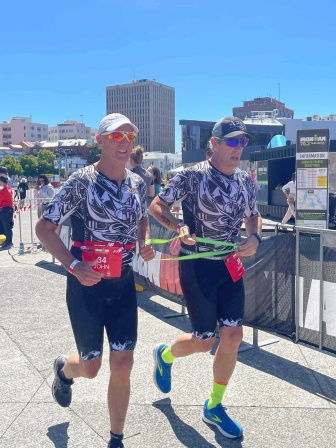NDIS enables John to continue participating in triathlons
Newcastle NDIS participant John Domandl loves participating in triathlons.
He’s done so for 37 years and says his NDIS funding has allowed him to continue to take part in a sport he’s passionate about.
Participating all over Australia and around the world, John, who has retinitis pigmentosa, a genetic eye condition causing vision loss, is a much loved and recognised athlete among his peers and the hundreds of spectators who flock to follow this extreme sport.
At 62, his triathlon rap sheet boasts over 150 events, and he holds 2 world records.
It’s an incredible effort for any athlete, let alone one who has between 5 and 8 % sight depending on the time of day and the environment.
John said in 2016 that he became the fastest person with low vision to complete an Ironman distance triathlon – a 3.8 km swim, 180.2 km cycle, and 42.2 km run.
Tethered to his triathlon pilot and long-time mate Paul McGlynn with a 90 cm hand cord, the duo completed the event in under 11 hours, smashing the previous record.
Then the duo participated in the World Triathlon Long Course Championships in Canada.
A distance event they completed a 3 km swim, 130 km cycle and a 30 km run in 7 hours, 41 minutes.
John secured the World Championships title for the fastest person with low vision to complete it.
'In 2015, I was also the first and fastest athlete in the world with low vision to participate in and complete the Australian Ultraman Triathlon in Noosa, Queensland,' he said.
'It was a 10 km swim, 420 km cycle and 84.4 km run, and I set a new world record posting 28 hours 23 minutes and 26 seconds, a record that still stands today.'
When Paul retired, and knowing these types of athletes are hard to find, John utilised his NDIS funding looking to source new training buddies and potential triathlon pilots/guides.
'I took to social media, and I was able to engage and employ other athletes from triathlon associations and clubs as support workers to continue to train with and possibly pilot me,' he said.
'Being self-managed I set my own fee.
'Everyone was happy with it.
'It’s worked out well plus it’s helping me to make my NDIS funding go that bit further.'
Back on track with his training regime, John said in 2021 he was in talks with fellow triathlete Jason Clark about giving piloting/guiding go, but Covid hit and put a stop to all events all around the world.
'It wasn’t until 2 years later, February just gone (2023), Jason and I finally made it to the start line of the inaugural Tasmanian Ironman 70.3 in Hobart,' John said.
'Jason is based in Tasmania so my partner Kim and I decided we would go down for a holiday and while we were there Jason and I could train for a few days and do the race.'
Having never trained with John, never piloted/guided him, or even ridden a tandem bike, Jason and John met up to take on this gruelling challenge.
'The race was on Sunday, so the Friday before Jason took me for our first swim tethered together in the (River) Derwent at 5 am.
'Boy was it icy.
'Then we went for our very first tandem bike ride, so I had to teach him how to ride the tandem,' John laughed.
'On the Saturday we did a 5 km Parkrun and another bike ride, and on the Sunday we did the Ironman – a 1.9 km swim in the Derwent, a 90 km bike ride with a huge vertical gain and we finished off with a 21.1 km run.
'It was tough.
'We did it.
'Jason was incredible.'
John said while he’s so grateful for Paul and Jason’s efforts it is hard to find people willing to commit to piloting/guiding athletes with vision loss in triathlons.
'It’s not like trying to find someone to do your paperwork or clean your house, it’s a very special person, they are out there, but some don’t even realise they can do it,' he said.
'Pilots/guides need to read the environment and alert me to things like any change in surfaces and if I get a bit off track there’s a bit of pushing and shoving to correct me, but we get there and that’s the main thing.'
Looking forward to clocking up 40 years in his chosen sport, John said the NDIS has been wonderful for him, particularly for his physical and mental health.
'As a person with vision loss it can be very isolating, but now we can actually pay people to come pick us up and take us out. It’s opened up a whole new world for me,' he said.

